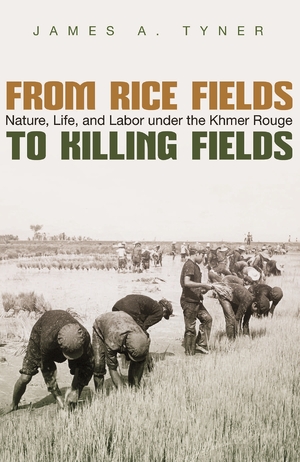"Tyner provides a unique perspective on one of the most brutal regimes of modern time. Serious political and economic scholars will welcome his solid logic coupled with the in-depth evidence he employs to connect the dots from tragic French colonialism to the atrocities of Democratic Kampuchea."—Historical Geography
"Eschewing the ready allure of psychological analyses of the killing, Tyner presents a documentary analysis of the policies and practices of the Khmer Rouge to establish the political and economic systems that wrought death.
"—The AAG Review of Books"Tyner’s focus on socioeconomic policies and his criticism of persistent myths about the Khmer Rouge make From Rice-Fields to Killing Fields a valuable contribution."—Jacobin
"Tyner challenges standard interpretations of Khmer Rouge policy on family, labor practices, the role of cities, industrialization, modernization, foreign policy, and more. Recommended."—Choice
"A must-read for students of Cambodia and of state-led economic development."—Andrew Mertha, professor of government, Cornell University
"Tyner's argument makes for bracing and timely reading in a world where exploitation and class politics seem as salient as ever, and where new generations struggle to develop alternatives."—Jim Glassman, professor of geography, University of British Columbia
"In this path-breaking and provocative work, Tyner examines the political economy of the Cambodian genocide through the lens of dialectical materialism."—Craig Etcheston, author of After the Killing Fields: Lessons from the Cambodian Genocide
Description
Between 1975 and 1979, the Communist Party of Kampuchea fundamentally transformed the social, economic, political, and natural landscape of Cambodia. During this time, as many as two million Cambodians died from exposure, disease, and starvation, or were executed at the hands of the Party. The dominant interpretation of Cambodian history during this period presents the CPK as a totalitarian, communist, and autarkic regime seeking to reorganize Cambodian society around a primitive, agrarian political economy.
From Rice Fields to Killing Fields challenges previous interpretations and provides a documentary-based Marxist interpretation of the political economy of Democratic Kampuchea. Tyner argues that Cambodia’s mass violence was the consequence not of the deranged attitudes and paranoia of a few tyrannical leaders but that the violence was structural, the direct result of a series of political and economic reforms that were designed to accumulate capital rapidly: the dispossession of hundreds of thousands of people through forced evacuations, the imposition of starvation wages, the promotion of import-substitution policies, and the intensification of agricultural production through forced labor. Moving beyond the Cambodian genocide, Tyner maintains that it is a mistake to view Democratic Kampuchea in isolation, as an aberration or something unique. Rather, the policies and practices initiated by the Khmer Rouge must be seen in a larger, historical-geographical context.
About the Author
James A. Tyner is professor of Geography at Kent State University. He is the author of more than a dozen books, including Genocide and the Geographical Imagination: Life and Death in Germany, China, and Cambodia.
October 2017



